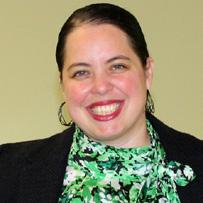
8 minute read
Creating an Effective Workplace
Creating an Effective Workplace
What Are You Doing to Advance Your Work Beyond the Students?
Advertisement
VIANCCA WILLIAMS
Defining an effective workplace can be difficult. Especially in fraternity/sorority life (FSL) where the industry is centrally focused on its primary customer: the student/member. In FSL, it is easy to focus tirelessly on the students — after all, providing support and creating a positive experience for undergraduate students is likely a strong motivating factor for why many choose to enter this field. While focusing maximum time and effort on direct student engagement and meeting student needs seems like a reasonable approach to FSL work, in practice it is unlikely to deliver optimal productivity for a work team or individuals.
More than ever, success in FSL requires action with intention, a collaborative mindset, and systems that ensure a holistic approach. This article outlines several areas professionals can focus time and energy for becoming well-rounded and balanced in their work. These approaches can help facilitate a healthier, more sustainable and productive career in FSL. Ultimately, this will result in better experiences for both students and professionals.
An effective workplace and a thriving team that efficiently utilizes resources to deliver maximum value requires an environment supporting a well-rounded approach. While student experience is the primary focus for advisors, it is important to remember individuals working in FSL serve hundreds, if not thousands of students. Making an impact on that scale requires conceptualizing work beyond individual action with a student. These roles, whether on a campus or headquarters, are dynamic and multidimensional. Therefore, FSL professionals should identify strategies to help manage their work more efficiently. To thrive in this work requires more than commitment and talent; structure and support are essential to fostering an environment where FSL professionals can succeed.

Act with Intention
For someone to be effective in their work, they need a structure providing guidance and evidence for why their work is relevant. Strategic plans and data can inform an intentional and focused approach.
• Revisit strategic plan(s) often. Strategic plans should create a road map for one’s work, enabling a focus on priorities. Therefore, it is important to refer to them. FSL professionals should assess how they have moved their department — and organizational or institutional — strategic plan forward regularly, and at a minimum, annually. If results indicate no forward movement, it is time to redirect efforts toward a new approach. If progress has been made, efforts should continue while also looking for opportunities to refine.
• Use assessment to make data-driven decisions. It is imperative to gather useful data to assess all aspects of the fraternity/sorority profession. Assessment enables professionals to evaluate growth, development, and learning, while gauging if methods are facilitating desired outcomes. Data offers insights into the perspectives of those most affected by the enacted experience. Data-driven decisions focus on maximizing strategies that help operations and minimizing things not adding value. Utilizing data requires professionals to ask the right questions, analyze the results, and create action plans for future endeavors. Assessment should not be feared; it should be embraced!
Consider the Supervisor & Supervisee Relationship
Both supervisor and supervisee benefit from a positive relationship that makes a workplace effective and moves the functional area forward. Take time to cultivate a relationship by doing the following:
• Make your supervisor look good. This concept can be difficult to grasp for someone who is keen on self-accountability. However, any new supervisor will quickly realize the employees they supervise are a direct reflection of them – when they mess up, the supervisor also messes up; when they win, the supervisor also wins. Giving due diligence, producing quality work, and looking at individual work as the team’s work helps make one’s supervisor successful as well.
• Manage up. This concept focuses on managing one’s supervisor and sometimes those above them. It is rooted in communicating needs. This includes having difficult conversations when needs are not met. Managing up also means being a resource to the supervisor by anticipating their needs and having solutions ready. Fraternity/sorority professionals are often considered the experts in their functional area — effectively managing up demonstrates that to supervisors.
• Set employees up for success. To do this, create effective hiring processes, fully onboard staff, conduct complete and holistic staff training, provide effective and timely feedback, evaluate staff consistently (not just during annual performance evaluation time), invest in staff via professional development, and recognize employees in a personal way when good things happen.

Cultivate Relationships
A unique aspect of FSL is the number of stakeholders invested in the experience. By taking time to invest in and cultivate strong relationships, fraternity/sorority professionals can leverage stakeholders to assist in advancing desired outcomes.
• Foster strong relationships with colleagues. Collaborating with others is essential in this industry. Doing this well requires taking time to actively cultivate relationships. Individuals should explicitly schedule time to get to know colleagues to avoid missing those opportunities due to getting caught up in day-to-day tasks. Timely and productive communication is also critical. It is important to avoid gossip, recognize others’ talents and strengths, collaborate on projects, and provide timely feedback from a place of care. Time spent engaging in any or all of the above often result in relationships moving initiatives forward.
• Provide support to colleagues. A silo effect emerges when people focus solely on their own work. This may hinder productivity because colleagues who can help work processes be more effective are not engaged. Taking time to help colleagues advance what they are working on is an important part of fostering a successful team. This is done by checking in, providing feedback, and assisting them in finding ways to collaborate.
• Engage non-student stakeholders. Non-student stakeholders can sometimes make or break how fraternity/sorority professionals move the needle in their work. As a result, it is important to keep lines of communication open with stakeholders such as advisors, alumni, HQ/campus, and the campus’ surrounding community. Get to know these individuals, understand their needs, find reasonable solutions to issues they experience, keep them updated on the fraternity/sorority community or inter/national organization, work through conflicts together, and create avenues for them to positively engage with undergraduate members.
Master Administrative Functions
One aspect of necessary FSL functions is administrative work. Mastering administrative tasks will move work forward and help individuals advance in the future. Those who struggle with administrative tasks have a hard time advancing.
• Create systems. Whether it is reviewing submitted paperwork, reading policies, or filling out documents, develop a system that works for you. Professionals need to find a way to organize themselves, develop an effective follow up approach, and spend time revising this system as needed.
• Be budget savvy. It is important to create, manage, and ethically approach budgets. When creating a budget, consider the true price of materials and services by gathering quotes before finalizing. Additionally, look at what can be let go when asked to make budget cuts. It is easier to be proactive and ready for this request instead of working through it in the midst of a budget crisis. Even if the organization has an accounting department, individuals should keep track of their own expenses. This helps create fiscal responsibility and cultivates a culture of employees being good stewards of the institution and/or organizational dollar.
Consider Personal Needs
To be effective in their workplace, individuals need to take care of themselves and advocate for their personal and professional needs.
• Seek professional development opportunities. Investing in professional development is critical for keeping work in FSL fresh. Make it a priority to find ways to constantly learn. Learning does not always have to occur at conferences. It can occur via webinars, reading books and articles, conducting informational interviews, having benchmarking conversations with colleagues, or watching a TED talk. When attending conferences, webinars, or workshops, review the information, discuss knowledge discovered with colleagues and your supervisor, and create action steps for how to apply these concepts. Conferences outside the normal scope of an individual’s current industry can also be helpful in providing new knowledge that is transferable to a current role.
• Take care of yourself. At the end of the day, effective employees take time to recharge. Take vacation time. Use sick days. Get a physical. Find a hobby and stick to it. Practice wellness strategies. Spend time with loved ones. Most importantly, remember life is not always about work.
Longevity is a concern, so to elongate time in FSL, professionals must make a concerted effort to enact these practices. Following through on these practices will have a positive impact on the work environment and on enhancing the overall student experience.
How to Take Control of Your Day
To create a more effective workplace, here are some suggestions for incorporating new practices to help reframe your work:
Avoid filling your calendar with meetings. Consider block scheduling — schedule time for projects and stick to those times by actually working on those projects.
Find time to talk to others throughout the day. It’s important to remember our work cannot be done in silos. Take time to engage with others by running ideas by them, getting feedback on performance, and working through challenging situations.
Don’t get sucked in to email. Like project planning, set aside times during the day to focus just on emails.
Make planning time a priority every week. Use this time to create a to-do list, make agendas for meetings, and find spaces for non-student work.
Determine how you will prioritize your work. A method to use is Eisenhower’s Box, which has 4 quadrants: urgent and important (tasks you will do immediately), important but not urgent (tasks you will schedule for later), urgent but not important (tasks you will delegate to someone else), and neither urgent nor important (tasks you will eliminate).
Temper procrastination. Be realistic in setting aside an amount of time something takes to complete. Challenge the temptation to wait until the last day to do something. Schedule work in smaller chunks, and work toward the final product piece by piece.
Don’t get bogged down by “the mess.” Find ways to be solution-oriented. Talk through situations with others, consider root causes, find what works, and stick to that solution.
Give yourself deadlines. You are your best accountability buddy — use that to your advantage.
Avoid multitasking. The human brain is not wired to multitask. Do one thing at a time and give it your full attention.
Resist the urge to keep your door open at all times. While we want to be available as much as possible, sometimes adding earbuds or simply closing the door might help with focus and task completion. Consider blocking time in your calendar to keep the door closed and place a note on it to share how to get ahold of you.

Viancca Williams is the assistant director of fraternity & sorority life in the Center for Student Involvement at the University of South Florida (USF). She is an active volunteer for the Association of Fraternity/Sorority Advisors, the Association of Fraternal Leadership and Values (AFLV), and her sorority, Alpha Chi Omega, and she serves as a co-lead facilitator for LeaderShape and the North American Interfraternity Conference programs. A native of Santurce, Puerto Rico, Viancca earned her B.A. in psychology from The University of Tampa, her M.Ed. from USF, and is currently in the dissertation phase of her Ph.D. (at USF) focusing on exploring the factors associated with retention and attrition of campus-based fraternity/sorority advisors.








